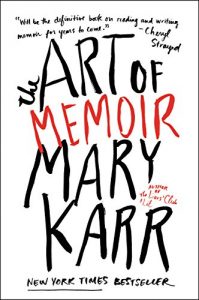As a nonfiction writer, I oftentimes *dream* about my finished memoir, face-out in chain bookstores across the globe. Then I start thinking of the people who I’m writing into my work who will read said book, and I’m crushed by anxiety/guilt/nervousness. Common questions that my mind loops include (but are not limited to): What will happen if so-and-so reads this? Will they be hurt? Will they agree with what I wrote? Will my mother/father disown me?
I’ve contemplated tattooing Anne Lamott’s famous quote, “You own everything that happened to you. If people wanted you to write warmly about them, they should have behaved better,” on the back of my hand so I can read it over and over while I type. But it doesn’t make me feel better about possibly hurting anyone’s feelings. (I’m a 2 on the enneagram, if you’re wondering who your narrator is).
 All this changed for me last fall, when I read The Art of Memoir by Mary Karr. Something inside me has always resisted the idea of books about writing books, but this one changed my mind. I read the whole thing—cover to cover—pen in hand, underlining a quarter of the text, and about 75% of the chapter, Dealing with Beloveds (On and Off the Page). Karr shares her process for managing her loved ones’ feelings about being included in her work in generous and thoughtful steps, 11 of them to be exact! Two of my favorites include a Herbert Selby quote, “If you’re writing about someone you hate, do it with great love,” and never claim authority over how people truly felt. Karr also recommends sharing parts of your work with the subjects on the page, especially if you think it “might make them wince.”
All this changed for me last fall, when I read The Art of Memoir by Mary Karr. Something inside me has always resisted the idea of books about writing books, but this one changed my mind. I read the whole thing—cover to cover—pen in hand, underlining a quarter of the text, and about 75% of the chapter, Dealing with Beloveds (On and Off the Page). Karr shares her process for managing her loved ones’ feelings about being included in her work in generous and thoughtful steps, 11 of them to be exact! Two of my favorites include a Herbert Selby quote, “If you’re writing about someone you hate, do it with great love,” and never claim authority over how people truly felt. Karr also recommends sharing parts of your work with the subjects on the page, especially if you think it “might make them wince.”
Easily influenced by all things I consume, I followed Karr’s advice by sharing a chapter of my manuscript with my sister over the summer. The best thing happened—she laughed when I poked fun at her credit score! “This is all sad, but true,” she said.
It felt pretty damn good. I can only write from my perspective. And I can only be honest. And be loving. But I own my story, so I get to write it.